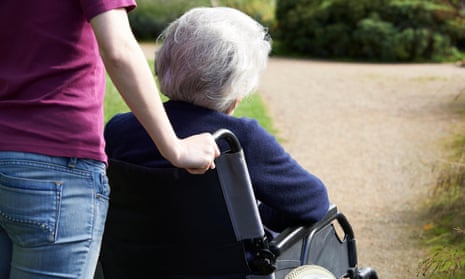Last year, the health and social care select committee highlighted the social care system as “unfair, confusing, demeaning and frightening for the most vulnerable people in our society and their families”. But while the select committee’s report stressed the need to address challenges for our elderly population and care workers, one group seems to have been forgotten yet again: unpaid carers.
These are the people who provide health or supportive care to an ageing parent, a family member or child with a disability, even a friend who is ill. Or, in my case, my sister, aged 29, who has severe autism and is looked after by my mother.
To put this in perspective, the charity Carers UK estimates there were up to 9.1 million unpaid carers across the UK before the Covid-19 pandemic, providing everything from a few hours a week to intensive and complex round-the-clock support. This is not a static population either. The pandemic has led to 4.5 million people doing some care work, 2.8 million of whom are juggling these new responsibilities with waged work.
The chances are you will find yourself in the role some day. According to a Carers UK report published in October, the majority of carers (81%) have taken on more care duties since the start of the pandemic. This is in part due to respite services – such as day-care centres or paid carers who help out at home – being forced to reduce their capacity or temporarily close. The pandemic may also have led to an increase in needs of the person being cared for, and the removal of the usual network of family and friends available to help.
Before the pandemic, the respite service that took my sister out for daily trips on weekdays was my mother’s only source of a break and time away from her duties. The service, funded by the NHS, would enable her to do her favourite activities: browsing shops, going bowling, enjoying a nice pub meal. Since it stopped my mother has been working to the point of utter exhaustion to keep my sister entertained and the family home in order.
The pandemic is shining a light on the all the time spent doing daily household chores, shopping, childcare, unpaid activities related to keeping up the house, and most importantly, caring for elderly people and other household or non-household members. Unpaid work keeps societies functioning, yet it is invisible to the eyes of most economists and politicians.
In the UK, unpaid carers are provided with an allowance by the government. But at £67.25 a week, which, when divided by the required 35 hours a week minimum needed to be eligible for it, this works out at just £1.92 an hour: offensively low. It’s due to increase by 35p a week on 12 April 2021 to £67.60, in line with inflation. That amounts to an increase of 5p a day.
What I have noticed from my mother, like many caregivers, is how she speaks about the joy and satisfaction of the work she does, despite the enormous hardship. Care work is, by its nature, notoriously difficult to value. However, the status quo is grossly unfair and inefficient.
Ed Davey, the leader of the Liberal Democrats, who has experience of caring for family members, has paid attention to this issue. But we need to go further. We need a “new deal” for unpaid carers with clearly defined state support and actionable social reforms.
The proposal of five days’ carer’s leave for employees – so they can have paid time to look after people – is also necessary. The stress of having to balance paid work and unpaid care has led to hundreds of thousands of people leaving the labour market entirely. The policy has already gone through a consultation period in parliament, but it isn’t set in stone yet and the government, according to Carers UK, has said they intend the leave to be unpaid. And, of course, the pitiful carer’s allowance needs to be increased.
But in the long term, the government needs a sustainable solution to fund social care, with unpaid carers at the forefront. Failure to do so will see the social care crisis spiral out of control, with knock-on effects on hospitals, the economy and, of course, people who need access to care.
I asked my mother her thoughts on being an unpaid carer during the pandemic. “This is nothing new to me,” she said. “We are part of the infrastructure of our whole society. We hold everything together.”
Rhi Storer is a journalist and a recipient of the 2019 Scott Trust bursary
